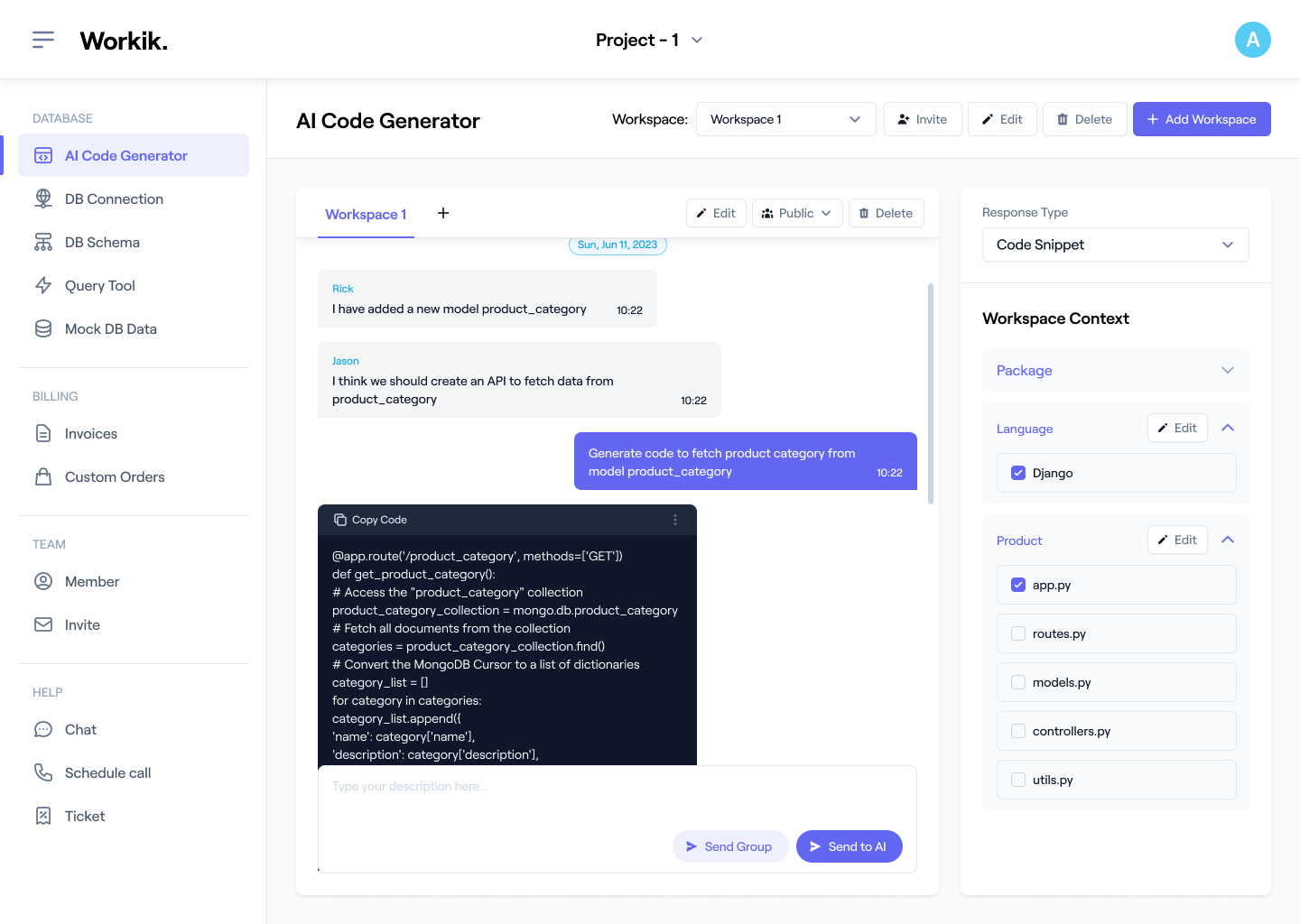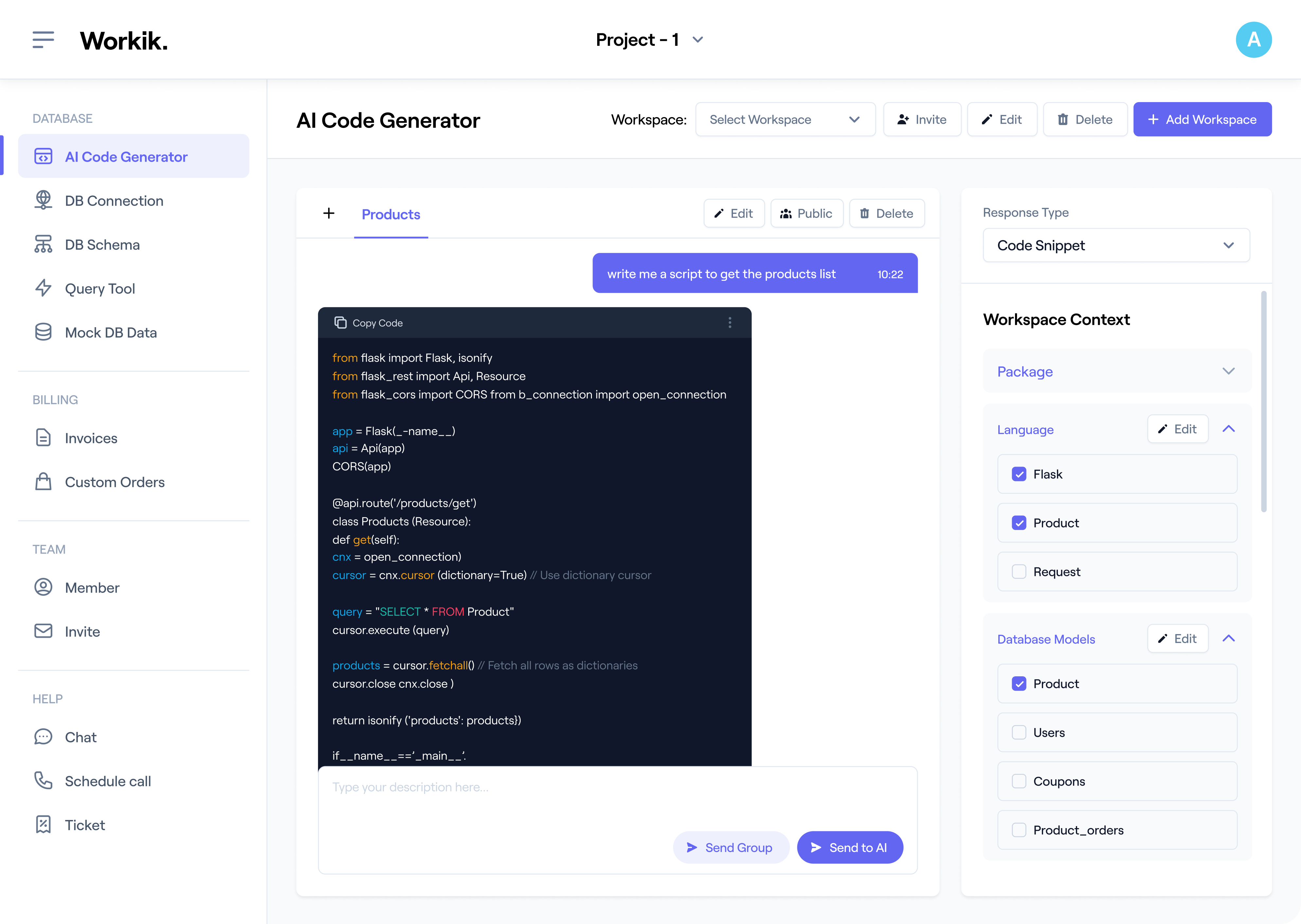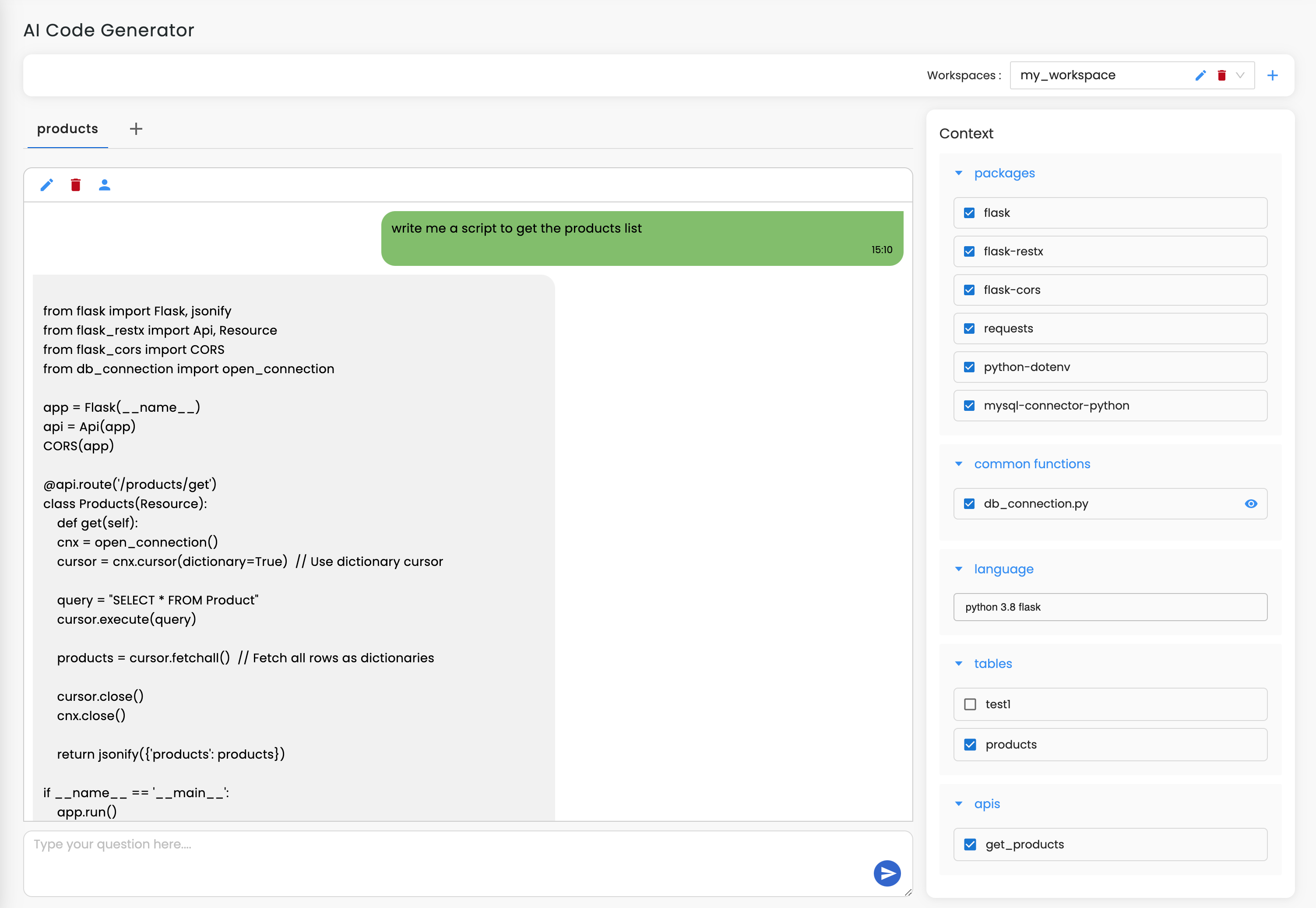
Join our community to see how developers are using Workik AI everyday.
Features

Instant Unit Tests
Use AI to generate cases for Python functions, covering edge cases, parameterized tests, and integration points.

Comprehensive API Checks
Create REST API tests for endpoints, status codes, and data integrity. AI enhances coverage using Pytest and Requests.

Streamline Data Validation
AI uses Pytest with Pandas and NumPy for data pipeline testing. Checks for missing values, data types, and transformations.

Optimize Web Testing
Automate Selenium tests using Pytest fixtures. AI can craft user flows to streamline setup for browser-based tests.
How it works
Create your free Workik account in seconds to access Workik’s AI-powered Pytest test case generator.
Import your Python project files and sync repositories from GitHub, GitLab, or Bitbucket. Define functions, modules, and target areas for AI-driven test generation.
Specify test requirements, and let AI generate Pytest cases for unit tests, API validations, or data integrity checks. AI identifies edge cases, parameterized tests, and optimizations for efficient testing and debugging.
Invite team members to collaborate on test cases in Workik. Use AI-generated test cases directly in your Pytest environment, ready for immediate execution and continuous integration.


Expand
.png)
.png)
Expand


Expand


Expand


Expand


Expand


Expand


TESTIMONIALS
Real Stories, Real Results with Workik
We generated unit tests and validated data pipelines in minutes with Workik’s AI—game-changing for Python automation!

Liam Nguyen
Senior Data Engineer
Workik has transformed my backend workflow. The AI-generated Pytest cases for APIs cover edge cases and boost performance!

Raj Patel
Backend Developer
As a QA Engineer, Workik’s AI saves us hours. Pytest cases for data integrity and async workflows are spot-on, driving team productivity.

Alex Mitchell
QA Engineer
What are the popular use cases of Workik's AI for Pytest test case generation?


Some popular use cases for Workik's AI-powered Pytest test case generator include but are not limited to:
* Generate comprehensive unit tests with minimal configuration for functions and classes.
* Automate API testing workflows with AI-generated requests and response validations.
* Validate data processing pipelines, ensuring type consistency and handling edge cases.
* Set up browser-based test flows quickly using libraries like Selenium.
* Integrate data validation testing within distributed data systems using Pytest.
* Generate parameterized test cases to validate multiple input-output scenarios efficiently.
* Simplify mocking and patching for unit tests using AI-driven pytest-mock integrations.
What kind of context can I add in Workik AI related to Pytest test case generation?


Setting context in Workik is optional but enhances AI-generated Pytest test cases. Here are the types of context you can add:
* Project files (import functions, modules, and classes from GitHub, GitLab, or Bitbucket)
* Testing specifics (Python language and libraries like Requests, Hypothesis, or Pandas)
* Libraries or tools (e.g., SQLAlchemy for database testing, Selenium for web tests)
* Parameterization details (e.g., defining edge cases, mock data, and expected outputs)
* API blueprints (e.g., Postman or Swagger for generating tests for RESTful services)
How can Workik’s AI improve my Pytest test coverage for complex applications?


Workik’s AI identifies coverage gaps by analyzing your Python codebase and suggesting targeted test cases for intricate code paths, nested conditions, and dependencies. For example, if your application has multiple nested functions, AI can generate test cases that cover rare and complex execution paths.
Can Workik’s AI help streamline database testing with Pytest?


Absolutely. Workik AI integrates with database libraries like SQLAlchemy, creating test cases that handle setup, teardown, and edge case scenarios. If you’re working with transactional data, AI can generate tests to validate data consistency across inserts, updates, and deletes.
How does Workik AI handle parameterization in Pytest for extensive testing?


With AI-powered test case generation, AI can quickly set up parameterized tests, allowing multiple sets of data to run through the same function. For instance, if you’re testing a calculation function with various inputs, AI can produce parameterized test cases covering multiple edge cases at once.
Can Workik AI generate Pytest test cases for asynchronous Python functions?


Yes, It can generate Pytest cases that cover async workflows, ensuring concurrency, timing, and response handling are validated correctly. For example, if your app relies on async API calls, AI-generated test cases will verify that responses and exceptions are handled reliably, simulating real-time asynchronous conditions.
How can I use Workik AI for UI testing with Pytest and Selenium?


Workik AI simplifies UI testing by generating Pytest cases integrated with Selenium for browser-based tests. If you’re testing user interactions, like form submissions or navigation flows, AI crafts test cases to mimic user behaviors across different scenarios, helping ensure seamless user experience across web applications.
Generate Code For Free

Pytest: Question and Answer
Pytest is a powerful testing framework for Python, designed for writing simple, scalable test cases. Known for its readability and flexibility, Pytest supports both unit and functional testing, making it ideal for test-driven development (TDD) in Python applications. It includes advanced features like fixtures, parameterized testing, and easy integration with other libraries, enabling robust, maintainable, and thorough testing.
Popular frameworks and libraries often used with Pytest include:
HTTP and API Testing:
Requests, HTTPX
Web Testing:
Selenium, Playwright
Data Validation:
Pandas, NumPy
Database Testing:
SQLAlchemy, SQLite
Mocking and Patch Tools:
unittest.mock, Pytest-mock
Test Coverage:
Coverage.py
Test Organization:
Pytest-xdist
Unit Testing:
Ideal for verifying individual functions or classes in Python applications.
API Testing:
Pytest, along with libraries like Requests, is widely used for testing REST and GraphQL endpoints.
Data Pipeline Validation:
Works well with Pandas and NumPy for validating data transformations and quality checks.
UI and Web Testing:
Paired with Selenium or Playwright, used for end-to-end testing of web applications.
Database Testing:
Used to validate data transactions and queries within the database for integrity and accuracy.
Career opportunities and technical roles for those skilled in Pytest include Test Automation Engineer, Quality Assurance (QA) Engineer, Python Developer, Backend Engineer, Data Quality Engineer, API Tester, and Software Developer in Test (SDET). Skills in Pytest are in demand for roles focused on automated testing, data validation, and continuous integration.
Test Case Generation:
Generate Pytest cases for functions, classes, and modules.
Edge Case Identification:
Identify boundary and edge cases to improve test coverage.
API Test Automation:
Automate API tests with Pytest and Requests, covering endpoints, responses, and status checks.
Data Validation:
Validate data pipelines with Pandas and NumPy, checking for missing values and data types.
Mocking and Stubbing:
Assist with mock and stub tests using unittest.mock or Pytest-mock for isolated testing.
Debugging Assistance:
Provide insights for troubleshooting failing tests.
Documentation and Reporting:
Create documentation and reporting for visibility and maintainability.
Explore more on Workik
Get in touch
Don't miss any updates of our product.
© Workik Inc. 2026 All rights reserved.

